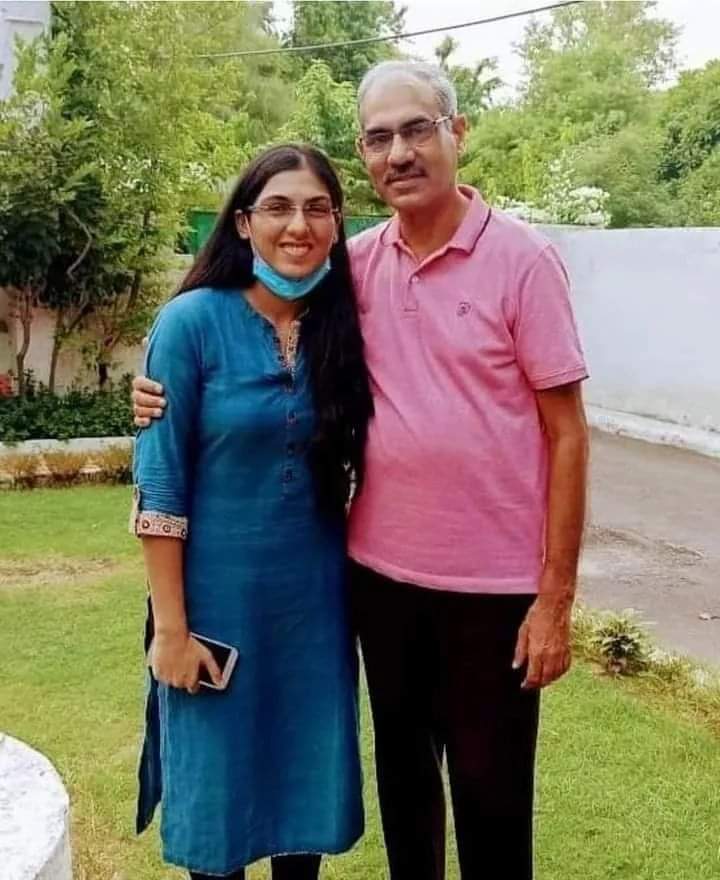Attempting the Union Public Service Commission’s (UPSC) Civil Service Examination (CSE) requires aspirants to devote close to one year to prepare. Devyani Yadav, who secured an All India Rank (AIR) of 11 in 2020, attempted the exam four times before she was successful.
After giving this exam five years of her life, Devyani shares her learnings with other aspirants. In 2014, Devyani graduated in Electronics and Instrumentation Engineering from the Goa Campus of BITS Pilani. Thereafter she took up a job with the private sector. “During my stint, I realised my aptitude was most suited for government service and I started preparing for the UPSC CSE,” Devyani tells The Better India.
Devyani’s father, Vinay Singh, has also been part of the administrative services as Hisar’s Divisional Commissioner. “A lot of my understanding of the services stems from having seen him work. Being able to make a difference at ground level was one of the major reasons I chose to appear for the exam,” she adds.
Devyani attempted the UPSC CSE for the first time in 2015 and again in 2016, however in both these attempts she was unable to clear the prelims.

In 2017, she made progress and reached the interview stage but did not find her name in the final list. In 2018, her fourth attempt, she secured an AIR of 222 and was allotted to the Central Audit Department.
She was undergoing probation when she appeared for the exam again in 2019.
Devyani shares her learnings with future aspirants:
1. Focus on your weakness:
While aspirants work hard on topics they are well-versed with, Devyani says equal, if not more, attention must be given to your weaker subjects. “Prioritise the topics that you feel are your weaker links. Make sure you stick to standard books and do not spend time on new content. Even while attempting mocks and analysing the answers, make sure you spend time on understanding the mistakes you have made,” she says.
Adding to this, she says, “Focus on limited resources while ensuring that you spend maximum time in revision.”
2. Quality trumps quantity:
An aspirant can spend all their time in preparation and still not get the desired results. Therefore, it is important to spend productive and quality time in preparation. “When I attempted the exam for the fifth time I was on probation. My work took up a lot of time throughout the week. However, I ensured that I put in double the effort during the weekends. Planning the schedule also helped in covering the syllabus efficiently.”
Approaching the exam with a concerted plan, she says, is what helped her secure a good rank in her fifth attempt.
3. Mock tests as self-evaluation tools:
Mock tests are a great way of self-evaluation. Devyani recommends solving a minimum of 40 tests before attempting the exam. “With each passing year, the UPSC CSE paper is getting more unpredictable. The more mocks you attempt the better your understanding will be. While attempting the mocks it is important not to get bogged down or overly confident with the mock scores. Use it only as a tool for analysis,” she says.
Spending an equal amount of time in the mock paper analysis will be beneficial to aspirants.
4. Sharpen your reading skills:
In an attempt to complete the paper quickly, aspirants might sometimes misread the question.
Devyani says, “Being able to read and understand exactly what is being asked of you is crucial to doing well in the exam. For example, a simple true or false question might be misread leading to loss of marks. While the question might ask aspirants to mark the ‘not true’ statements, not reading it correctly, might lead to the wrong answer in itself. So, learn to read with a critical eye.”
Given the negative marking that the paper carries, stay away from making these small errors.
5. Strike a good balance:
Since the paper carries negative marks for wrong answers, aspirants must be confident of marking their answers. “Striking a good balance between answering questions you are unsure about and completely unaware of is an important aspect. It is preferable to answer a few extra questions so that even if you get a few wrong, the average is high. I would attempt between 85 to 90 questions.”
6. Bring honesty to your preparation:

“Being 100 per cent honest with yourself while preparing is very important. No matter how many attempts you have given, approach each exam with a clear mindset. Overconfidence and underconfidence should both be kept away from you,” says Devyani. At every stage of preparation, aspirants must continue to be optimistic about it. That frame of mind also helps approach the exam better.
Stay as positive as you can to be able to tackle the vagaries of the UPSC CSE.
7. Devise your note-making strategy:
Structure your notes by the time you have to prepare. “Notes should not be a reproduction of what you have read in the book. It must be put down in your own words. The notes should only have details that need to be revised at a later stage. Optional paper requires extensive reading and making notes for that is prudent. However, content for general studies is readily available in note format, so you can skip it,” says Devyani.
Use technology to your advantage while making notes – there are plenty of applications that make it easy to store details.
8. Find online content that works:
Various online portals are useful for aspirants. Devyani shares the name of a few – Study IQ, which is a portal that does topic wise analysis of different issues. This helps in forming opinions on a wide range of topics. Mrunal and Insights on India are two other portals that Devyani found useful during her preparatory journey. “A lot of my answer writing skills were bettered by reading some of the answers that would be put out on these portals. It gave me a good understanding of how answers can be best structured,” she says.
Watching videos of toppers talking about their journey is also inspirational and has many takeaways for aspirants.
9. Go through previous prelim papers:
Pick the last 10 years’ prelims paper and ensure that you go through them with a fine-tooth comb. “Not just the questions but also spend time on looking at the options provided in the paper. There are times when an option can be asked as a full-fledged question the next year. Therefore, going through the prelims papers with this in mind will help you prepare better.”
Once you solve the prelims papers, set time aside to analyse and work on your mistakes as well.
10. Focus on presentation:
As much as content is important, remember that presentation is also a key aspect. With the examiner having to mark several answer sheets a day, making your answers stand out will hold you in good stead. “A few small tweaks while answering the paper can help. Underline the part that you want to draw attention to. If you are mentioning some statistic or a quote, draw attention to it by either writing it in bold or by highlighting it. You can also use visual content, like diagrams, maps or flowcharts to accentuate your answers.”
Do what you can within the time frame you are given. Do not spend extra time on making visual content or highlighting important points.
In conclusion, she says, “There is no alternative to hard work. This exam demands your respect and if successful, the gains are very high. So just stay focussed.”
(Edited by Yoshita Rao)
No comments:
Post a Comment